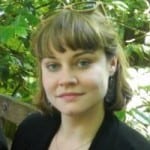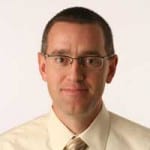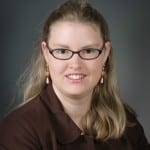The 2016 Symposium will feature a faculty panel and two keynote speakers.
Keynote Speaker Bios:
 Anne Chin, Professor, Geology & Environmental Science, University of Colorado, Denver, Editor -in-Chief for journal Anthropocene.
Anne Chin, Professor, Geology & Environmental Science, University of Colorado, Denver, Editor -in-Chief for journal Anthropocene.
Anne Chin is a geomorphologist with expertise on the dynamics, morphology and evolution of river systems. Her interdisciplinary research focuses on interactions and feedbacks among geomorphological, ecological, and human processes. Her work on coupled human-landscape dynamics also concerns societal responses to landscape change, with implications and applications for environmental management and policy. Dr. Chin joined the University of Colorado Denver in 2010, after serving on the faculty at Texas A&M University for 13 years. In 2006-2007, she was Director of the Geography and Spatial Sciences Program of the National Science Foundation. She was also appointed a Fellow (2009) of the Leopold Leadership Program of Stanford University, an Editor (2011-2013) ofEarth-Science Reviews, and Editor-In-Chief (since 2012) of Anthropocene. She serves on numerous scientific advisory panels and recently completed service on the Committee on Challenges and Opportunities in Earth Surface Processes of the National Research Council. Dr. Chin’s awards include the G.K. Gilbert Award for Excellence in Geomorphological Research from the Association of American Geographers (AAG) and the Distinguished Achievement Award in Teaching and Montague Scholar Award from Texas A&M. She is a member of the AAG, American Geophysical Union, European Geosciences Union, and Geological Society of America, where she is currently First Vice Chair of the Quaternary Geology and Geomorphology Division.
 Peter Hotez, Dean for the National School of Tropical Medicine,Professor, Departments of Pediatrics and Molecular Virology & Microbiology, Baylor College of Medicine, Houston, TX
Peter Hotez, Dean for the National School of Tropical Medicine,Professor, Departments of Pediatrics and Molecular Virology & Microbiology, Baylor College of Medicine, Houston, TX
Peter J. Hotez, M.D., Ph.D., is the Baker Institute fellow in disease and poverty. He is dean of the National School of Tropical Medicine and professor of pediatrics and molecular virology and microbiology at Baylor College of Medicine, where he is also chief of the Section of Pediatric Tropical Medicine and the Texas Children’s Hospital Endowed Chair of Tropical Pediatrics. He is the president of the Sabin Vaccine Institute. Hotez is an internationally recognized physician-scientist with expertise in neglected tropical diseases and vaccine development. He leads the only product development partnership for developing new vaccines for hookworm, schistosomiasis and Chagas disease. At the Clinton Global Initiative in 2006, he co-founded the Global Network for Neglected Tropical Diseases to provide access to essential medicines for hundreds of millions of people. He is the author of more than 300 original papers and the acclaimed book “Forgotten People, Forgotten Diseases” (ASM Press). Hotez previously served as president of the American Society of Tropical Medicine and Hygiene and as founding editor-in-chief of PLoS Neglected Tropical Diseases. He is an elected member of the Institute of Medicine (IOM) of the National Academy of Sciences. In 2011, he was awarded the Abraham Horwitz Award for Excellence in Leadership in Inter-American Health by the Pan American Health Organization of the World Health Organization. In 2015, the White House and U.S. State Department selected Hotez as a United States science envoy. He obtained his undergraduate degree in molecular biophysics from Yale University in 1980 (Phi Beta Kappa), followed by a Ph.D. in biochemical parasitology from Rockefeller University in 1986 and an M.D. from Weil Cornell Medical College in 1987. Click HERE to read his recent article in the Washington Post, “A New Wave of Diseases Threatens Southern Europe and the Middle East.”
Panelist Bios:
 Julia Daniel is an assistant professor of modern American poetry at Baylor University with a focus in environmental humanities and urban studies. Her book project, Building Natures, traces the depiction of American city and national parks in modern verse. She has also recently contributed to the collection Modernism and the Anthropocene, as well as co-editing Modernism in the Green, a series of essays that explore the role of public green spaces in literary and cultural modernism.
Julia Daniel is an assistant professor of modern American poetry at Baylor University with a focus in environmental humanities and urban studies. Her book project, Building Natures, traces the depiction of American city and national parks in modern verse. She has also recently contributed to the collection Modernism and the Anthropocene, as well as co-editing Modernism in the Green, a series of essays that explore the role of public green spaces in literary and cultural modernism.
 Joseph Ferraro is an Associate Professor of Anthropology (BA, Indiana University; MA, UCLA; PhD UCLA) at Baylor University. Dr. Ferraro writes: “I am an anthropologist with broad interests in the evolution of human biology. In short, I am interested in why we look and act the way we do. How are we different from other animals? How are we similar? Why? What was the course and context of our evolutionary journey over the last 8 million years or so that saw us transformed from what was presumably a rather run-of-the-mill African ape into something inarguably… well, odd (but incredibly interesting!)? In terms of method and theory, I use paleontology, geology, and archaeology as tools to address research questions firmly grounded in biological theory. Recently, I have published the earliest zooarchaeological evidence for early human hunting and scavenging activities, with implications for the evolution of hominin diets, encephalization, foraging ecology, biogeography, and sociality. Other interests include Paleolithic technology, vertebrate paleontology, and reconstructing hominin paleoenvironments. I conduct fieldwork in northern Kenya and am PI of the NSF-funded Chalbi Basin Paleoanthropology Project, a large multi-national interdisciplinary team investigating human-environmental interplay over the last 4+ million years.”
Joseph Ferraro is an Associate Professor of Anthropology (BA, Indiana University; MA, UCLA; PhD UCLA) at Baylor University. Dr. Ferraro writes: “I am an anthropologist with broad interests in the evolution of human biology. In short, I am interested in why we look and act the way we do. How are we different from other animals? How are we similar? Why? What was the course and context of our evolutionary journey over the last 8 million years or so that saw us transformed from what was presumably a rather run-of-the-mill African ape into something inarguably… well, odd (but incredibly interesting!)? In terms of method and theory, I use paleontology, geology, and archaeology as tools to address research questions firmly grounded in biological theory. Recently, I have published the earliest zooarchaeological evidence for early human hunting and scavenging activities, with implications for the evolution of hominin diets, encephalization, foraging ecology, biogeography, and sociality. Other interests include Paleolithic technology, vertebrate paleontology, and reconstructing hominin paleoenvironments. I conduct fieldwork in northern Kenya and am PI of the NSF-funded Chalbi Basin Paleoanthropology Project, a large multi-national interdisciplinary team investigating human-environmental interplay over the last 4+ million years.”
Paul Martens is an Associate Professor of Religion at Baylor University. He teaches ethics and his research concentrates on the contested relationship between religion and morality. He is the author of The Heterodox Yoder and numerous articles ranging from religious motifs in Metallica to the ethics of Soren Kierkegaard. In his spare time, he enjoys riding bike, running, and raising chickens.
Dr. Christie M. Sayes is an Associate Professor of Environmental Science and Toxicology at Baylor University. She is a subject matter expert in nanomaterial-related toxicology and exposure. Her activities include working with partners, collaborators, and clients in designing & directing studies and training & advising facility staff. She possesses a working knowledge of laboratory science and U.S. regulatory climates. Sayes was formerly a Director of the environmental health program at RTI International and an Assistant Professor of toxicology at Texas A&M University. She has authored numerous publications, including original research, invited reviews, and book chapters. Sayes is a member of the Society of Toxicology and recently served on the Scientific Advisory Board for the EPA’s FIFRA Program. She also serves as Associate Editor for RSC Toxicology Research and on the Editorial Board of the journals Toxicological Sciences, Nanotoxicology, and Toxicology Letters. Christie received her PhD in Chemistry in 2005 from Rice University. Her dissertation focused on the nano-bio interface. In 2005, she joined The DuPont Company as Visiting Scientist and aided in the drafting of the DuPont-Environmental Defense Nano Risk Framework


